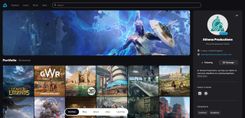Table of Contents
- What is Freelance Concept Artist?
- How Does Freelancing Work?
- How To Go Freelance
- Advertising Yourself
- Pricing your work and time
- Time Management and Self-Discipline
- Finding Work as a Freelance Concept Artist
- Dealing with Client Relations
- The Dreaded Admin Work
- Work-life Balance
- Evolving Your Art and Career
- The Realities of Freelancing
- Final Thoughts
Becoming a Freelance Concept Artist in 2026: A Realistic Guide
Explore our guide about the realities of freelancing as a concept artist, from navigating client relationships and managing finances to maintaining a healthy work-life balance.
Many concept artists find themselves at some point in their career considering going freelance. Taking the leap into freelancing and leaving a full-time job can be a terrifying prospect and can feel much like jumping off a cliff as you are assembling the plane on the way down. Work can be inconsistent and the hours can be long but it can provide freedom in your work-life unlike anything else.
It is natural to feel worried, or nervous about your first foray into freelancing but our experienced concept art team at Athena Productions are a wealth of knowledge on the subject, having been through it all, from working in studios, to having to fend for themselves as first time freelancers.
But how exactly can you be a freelance concept artist? How do you start and what are the freelancing mistakes that we made, that you can avoid? In this article, we're exploring how you can take the leap in 2026 to be a freelancer concept artist, and how you can thrive while doing it - whether that's in the gaming, film or TV industry.
You can also watch our full video here on How to Be A Freelance Concept Artist.
What is Freelance Concept Artist?
Let's begin by defining what a freelancer is. They are a self-employed person, who offers specialized services to clients. In this case, we are looking at concept artists who offer their concept design skills to clients on a freelance basis where they can take on as much or as little work as they want.
Companies and individuals may hire freelancers to help them with a specific task, but these freelance artists are contractors and are not employees of these companies, and as such they pay their own self-employment taxes. Most freelancers will also have to save for retirement and cover their own insurance.
A freelancer can have different motivations and personal inspirations that has led them to pursue a career as a freelance concept artist. It can be the allure of having a more balanced workload, working for different studios, working from home or freedom in your freelance art career over an in-house artist position.
How Does Freelancing Work?
Freelancers are self-employed people and are typically engaged by companies of varying sizes to help on projects. Clients are often searching for freelancers to fill in a gap in their resources and help them to miss deadlines without having to hire someone full-time - especially if they don't see the role being needed long-term.
Instead of being employed full-time, freelancers have the freedom to set their own hours, take as many projects as they want and work from wherever they wish.
The freelance process usually goes like the below:
- Either the freelancer or client will get in touch via email or social media and there will be some potential work that the client needs doing.
- The freelancer will accept the work, sign an NDA (if required) and contract (always recommended!) at an agreed price whether hourly, daily, or a flat project rate.
- The freelancer will work on the project, receiving feedback from the client as they go.
- The artist will wrap up the project and hopefully leaves the client happy and delighted!
- At the end, the client will pay the freelancer for the work done.

How To Go Freelance
There are many reasons why you might consider going freelance. It could be something you started as a side project, or it might be your only option for earning income at the moment. Perhaps you’re seeking more flexibility in choosing when and where you work.
However, freelancing can be notoriously tough. Freelancers need to excel in a wide range of skills, from marketing themselves and managing finances to building strong client relationships and delivering high-quality work. Essentially you need to think of yourself as a one-person business!
Advertising Yourself
As a freelance concept artist, making yourself stand out and building a unique personal brand in a competitive market can be difficult.
Which is why you need to identify the most effective social media platforms to build your professional network and keep an eye out for freelancing opportunities.
Platforms like ArtStation and LinkedIn, are the most commonly frequented by industry professionals, including art directors and recruiters who often use these channels to find new talent.
The first step is to regularly update and advertise your portfolio. Maintaining an updated and visible portfolio and online presence on these platforms is crucial for job opportunities.
Your portfolio acts as your "shop window", where you display your services and expertise to potential clients. Your portfolio should reflect your personal brand, offering a glimpse into your unique artistic voice, inspirations and the types of projects you aspire to work on.
To stand out, it’s essential to regularly update your portfolio with your strongest and most relevant work, while removing outdated pieces or student projects that no longer reflect your current skill level.
Demonstrating your artistic process from rough sketches to polished pieces can also give prospective clients insight into how you work which will build trust.
Including case studies from previous projects also adds to your expertise, experience and the trust your potential client has while weighing up other artists.
💡 Tip: Our team at Athena Productions will often post on LinkedIn when looking for freelance concept artists to support our team and we frequently see posts from other studios seeking freelancers on there as well!
Pricing your work and time
Pricing your work as a freelance artist can be challenging, as transparency around rates is often lacking and many artists tend to underestimate their value. The average salary for a freelance concept artist in the UK in 2025 is £37,000 per year, according to Glassdoor.
A good starting point is to carefully assess your monthly expenses and plan your freelance rate accordingly. If you worked full-time at a certain day or hourly rate, would it barely cover your expenses, or would you have enough to save? Remember, as a freelancer, you won’t be earning if you are sick, on holiday or experiencing slow periods so budgeting for these times is essential. You will also be responsible for contributing to your retirement fund which is why freelancer fees are typically higher than full-time salaries.
It is also a good idea to make sure your rate allows you to save for those quieter moments, and to set aside an emergency fund of at least 3 months to cover your expenses if the market gets quiet.
We also recommend having conversations with fellow artists who have experience freelancing, so that they can help you decide what to charge or what you can expect.
Time Management and Self-Discipline
Being in control of your own time as a freelancer can be incredibly freeing, but as a concept artist, working with deadlines is a constant reality. The work can be fast paced and managing your time effectively is a crucial skill to delivering quality work on schedule and having clients coming back to you regularly.
As a freelancer, you will always be working to a client's deadlines rather than your own. Often you don’t have the luxury of spending days perfecting one image.
Learning to balance creativity with deadlines can be difficult, especially if you tend to lose track of time while painting. But by staying organized you can strike a balance. You can use time-tracking tools such as Trello, ClickUp and Notion to help you stay focused by organizing tasks, deadlines and priorities.
Scheduling your workday and creating structured routines will also give you a greater sense of control whether through an app or just on paper. If you struggle with losing track of time, setting alarms or reminders can help ensure you submit work on time and stay focused on your progress.
Finding Work as a Freelance Concept Artist
One of the most frequently asked questions our team gets is how to find work as a freelancer.
Finding consistent work is the most difficult and unpredictable part of being a freelance concept artist. One month, you may have made £4,000 and the next month £100 which can be a terrifying jolt, leaving you wondering how you can keep a steady income. Many people say that freelancing is a constant feast or famine cycle which is why we recommend trying to build up your emergency pot as much as you can.
Developing multiple strategies and methods for finding and attracting clients as a freelance concept artist is essential. Here are a few we recommend:
- Social Media: Platforms like LinkedIn, Instagram and ArtStation are great tools for client acquisition. Use them to showcase your work and attract potential clients.
- Job Boards: Keep up to date with job boards, such as ArtStation Jobs, LinkedIn or relevant forums where people may post freelance opportunities.
- Direct Contact: Reach out to potential clients through their careers pages, social media, industry events or by email. Approach studios, indie developers, art directors, production designers and others who you think may need your skills or services, even if in the future. However, remember to be polite and avoid hassling people. Many are busy or may not have opportunities available at the moment.
- Personal Projects: Sharing personal projects can be a fantastic way to market yourself. Our Creative Director, Ellie Cooper, says “Whenever I posted on ArtStation during my freelance career, I would get messages enquiring about my availability in the weeks following. I genuinely believe it helped me get noticed, or people found my work through someone else's likes which led clients to getting in touch.” Although it can be hard to stay motivated during downtimes, keep creating and posting as you never know who might see your work!
- Referrals and Word of Mouth: If you have done great work for a client, they may refer others to you. It can be one of the most powerful ways to get more work.
💡 Tip: At Athena Productions we often find our freelancers through ArtStation, or from applications we have received into our studio from our jobs page.

Dealing with Client Relations
As a freelancer, building strong relationships with your clients is critical for success. Being professional, enthusiastic and friendly can help you develop long-term connections, leading to recurring work and referrals. Freelancing is rarely a 'one-and-done' situation and maintaining these relationships is key.
Good communication is essential for freelancing success. Being able to understand briefs, manage expectations, be consistent and hit deadlines is just as important as delivering high-quality work. Clear communication builds trust, which can lead to more projects and referrals.
A significant part of a concept artist’s job is handling the feedback loop. Don't be defensive when getting feedback, it should be viewed as constructive. A good way to frame it, it that both you and the client share the goal of creating the best possible result. Approaching revisions with resilience and professionalism will further reinforce client trust and open doors to future opportunities.
The Dreaded Admin Work
Admin work includes essential tasks such as accounting, invoicing, reading and signing contracts, paying taxes and more. While it may not be the most exciting part of freelancing, it’s not something you can avoid if you want to thrive as a freelancer - and certainly not if you want to avoid getting into trouble with the tax man!
Fortunately, there are great accounting tools available to make your life easier, such as Xero that can help you manage your finances. These tools can help you to keep track of outstanding client invoices and your expenses (e.g Software Subscriptions).
Additionally, remember that as a freelancer, you need to set aside money for taxes, retirement, savings and insurance. Unlike a full-time job, your freelance clients won’t make contributions toward these on your behalf.
💡 Tip: If possible, we recommend hiring an accountant to help you file your tax returns. This means you are confident in the accuracy of what you are submitting and removing stress from you to let you get back to doing what you do best!
Work-life Balance
Burnout is a very real challenge for freelancers, due to the anxiety of inconsistent work they will often work overtime and in doing so sacrifice much needed downtime. Maintaining a healthy work-life balance and preventing burnout as a freelance concept artist can be difficult, but coming up with strategies to prevent that is important for a long-term career.
It is important to keep your motivation going and to keep producing high-quality work for your clients to keep the cycle going.
Balancing admin tasks, marketing yourself, creating personal artwork, completing client projects and still finding time to enjoy life can feel like a constant tug-of-war. However, it’s important to carve out time for yourself such as taking breaks, going on holiday or visiting friends to prevent burnout and maintain a healthy work-life balance.
Evolving Your Art and Career
Freelancers are hired for the specialized skills and talent that they can offer to a project. It can be easy to forget with all of the other tasks you need to do, but continuously learning and improving as the industry evolves is key.
Fortunately, there are many online courses available today, such as those offered by Learn Squared, CGMA and ArtStation, that can help you stay ahead.
As a freelance concept artist, you won’t be able to learn or interact with colleagues as easy as you can in a studio setting, so attending industry events where demonstrations or workshops are held like Concept101, LightBox and others can be invaluable.
The Realities of Freelancing
We spoke to a few members of our team to gather their personal insights and reflections on their freelancing journeys. They’ve shared some valuable tips and tricks that they have learned to help you survive as a freelancer.

For our Senior Concept Artist, Titas, learning to balance your mental health against the unpredictability of freelancing is key:
"Being a freelancer has been an incredibly rewarding experience for me. The freedom to work from anywhere and set my own schedule is liberating and I’ve had the opportunity to work on some truly exciting projects. However, freelancing does come with its challenges. One of the biggest is the lack of guaranteed work, which can create a certain level of anxiety. Over the years, I've developed strategies - both mental and financial - that have helped to manage the uncertainty. Learning to embrace the unknown is key; you have to be comfortable with not always knowing what the next few months will bring. Alongside this, it's essential to stay on top of your expenses and ensure you have a financial cushion, ideally several months of living costs saved up, just in case.
Another challenge is the isolation that often comes with working solo from home. Without a team physically around you, it’s easy to feel disconnected. For me, it’s crucial to balance this by engaging in social activities after work, whether it’s meeting friends, chatting or participating in group activities. Doing this regularly has helped to boost my mental health and overall well-being.
Balancing the ups and downs of freelancing takes time, but with the right mindset and habits, it can be incredibly fulfilling.”

Our Senior Concept Artist Eliott gives a varied look at freelancing, highlighting how many skills you need to be able to balance while still producing quality work:
“As a freelance concept artist, you need to be highly flexible and open-minded about the work you take on, as you never know what a client may require. Having a broad range of skills is always an advantage, especially since freelancers are more likely to switch between projects at a faster rate than studio work.
Naturally, you’ll be dealing with deadlines and some will be tighter than others. In these cases, it’s important to evaluate your workload and organize your time effectively. Freelancing can be intense, especially when balancing client projects with personal work. That’s why it’s important to schedule your time carefully and know when to take breaks for other activities to avoid burnout.
Another essential skill is strong communication. Keeping clients updated and collaborating closely with your art director (AD) is key to success. Being willing and able to iterate based on feedback is also key.
On a totally different level, having clear and organized paperwork is important. This will vary depending on your country and work status. For example, in France, where I live, paperwork can be quite demanding. Staying organized allows you to focus on what truly matters—the art!”
Final Thoughts
Being a freelancer can be challenging, but the rewards can be significant. Successful freelancing involves many skills besides completing the work to a high standard. You need to have effective financial planning, self-promotion and a proactive approach to client engagement to help you really stand out and build a sustainable income.
We’ve all made our fair share of freelancing mistakes in our careers and we hope this article helps you navigate the journey into the world of freelancing with greater confidence.
Athena Productions is a concept art studio and we would love to hear from other talented, experienced concept artists to join our team working on blockbuster video games, award winning advertisements and explosive TV and Film projects. If you are interested in sending us a speculative application, get in touch with us today!



